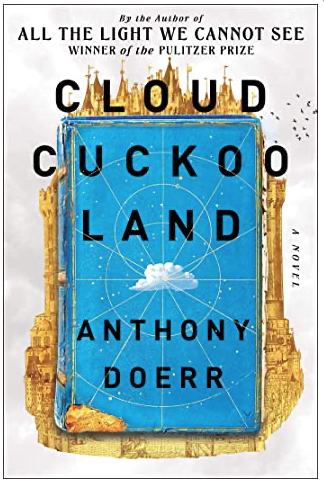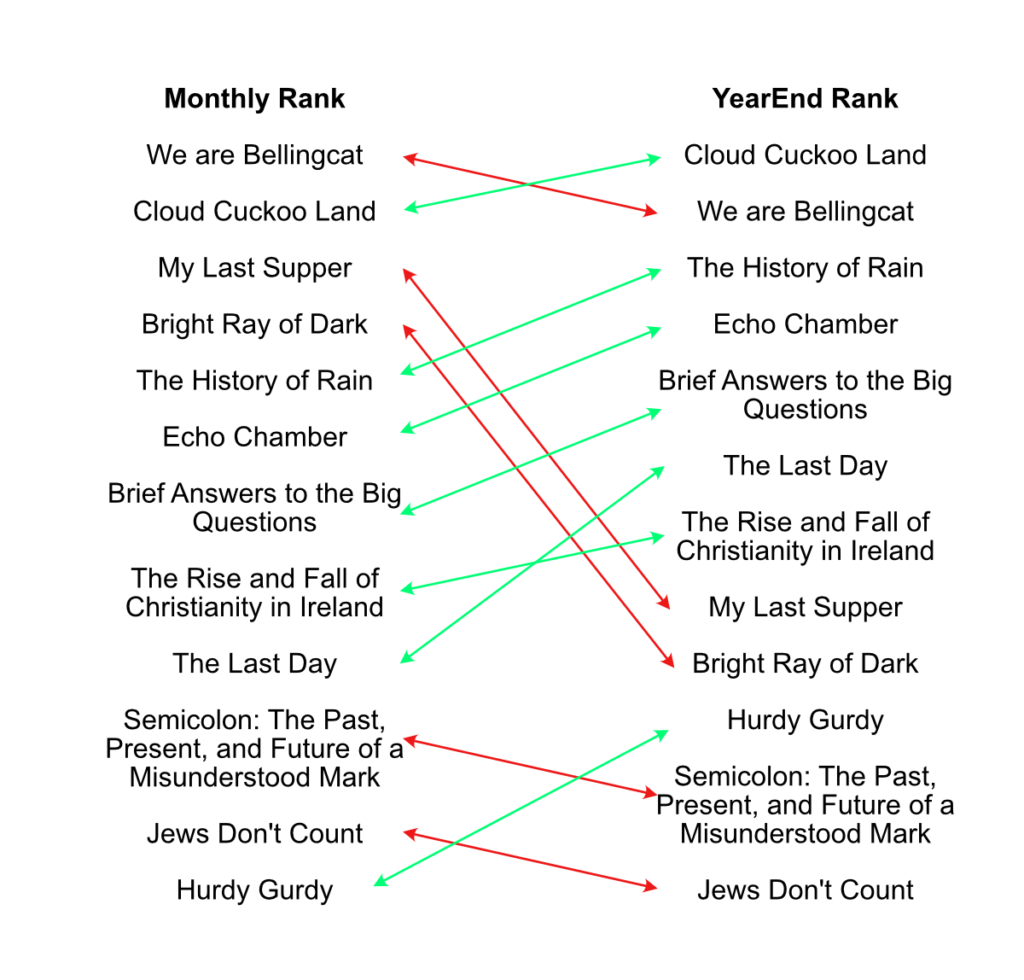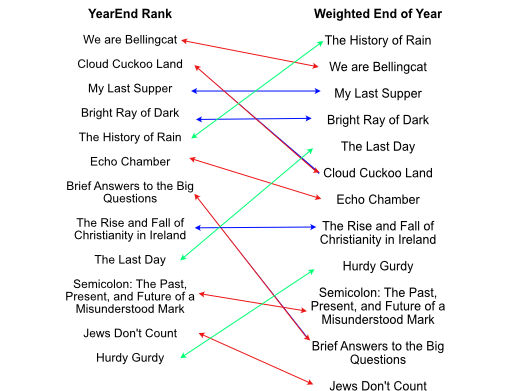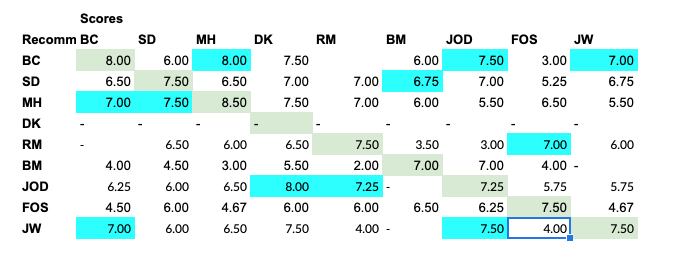
Another ‘non-normal’ year. No repast in the cosy cellar of the RIYC or a pre-dinner reception at the house of distinguished members. Nonetheless coming together on Zoom we found that festive frivolity but as always very serious reflection both on the December read, Brief Answers to the Big Questions by Stephen Hawking. We enjoyed a review of the year’s reads to recognise our book of the year. As always superbly coordinated by our corresponding secretary and head gamemaster, ably chaired by the sponsor of December’s read. A nearly complete cohort enjoyed frivolity, festivity, and deep literary appreciation along with abundant good cheer.
As we went into the end-of-year tabulations, our monthly reads were ranked according to the average scores offered immediately after reading. These were done the month they were read and our final December book was discussed and ranked prior to revealing the end of the year balloting. We Are Bellingcat by Eliot Higgins achieved the highest score during the year. The monthly reads were ranked:
Following discussion of our December read, we turned to the highlight of the year - an opportunity to reflect and rank all of our reads in a Eurovision-style balloting system. The ballots were shared a week in advance and completed prior to the evening. In the full Eurovision experience, we gradually reveal from our lowest (1) choices to our final best choice of the year and the excitement builds. This year again, we ended up with a clear winner but unlike last year, the monthly highest-ranked slipped a little bit in our remembrance, and this year's end-of-year winner: Anthony Doerr's Cloud Cuckoo Land. It was well-appreciated, rated by all members, and nearly read by all with an average score of 6.88 - somewhat lower than previous year's winners. On the upside, this certainly suggests that we are tapping into a fine subjectivity and proposing books that lead to some discord, varied opinions, and ultimately brilliant discussion.
The
- Cloud Cuckoo Land with a solid 77 points followed by
- We Are Bellingcat (the quiet runnerup - but substantially behind) at 59.
There were some winners and losers from our month-to-month rankings as the following chart shows, mapping the ranked scores from the 12 months against the year-end ranking. We actually had more winners than losers this year which suggests to me that we are a critical bunch when we are close to the source, but possibly less so through the mists of time.

The top slot was swapped between our monthly scores and the final reflective score. finishing book 'The Glass Hotel' won both the monthly and yearly tabs. The Last Day and Hurdy Gurdy both managed significant gains - on recollection, it appears they may have struck a chord - feel free to discuss. However, we also had some bigger losers - challenging me as they were my higher picked reads at the end of the year 😉 The bottom three choices stayed in the bottom and don't seem to have gained over the year or on further reflection.
One factor that we are always conscious of is the fact that the books read earlier in the year have to either be memorable to battle it out lest they suffer from a more recent familiarity with good (or in fairness bad) reads later in the year that may receive an unintentional bump based on our faltering memories. To try a little exercise in controlling for this I gave some slight weighting +/- up to 20% of point score in the final meeting based on the reading sequence. Interestingly The big gainer in the end-of-year ranking also takes a huge jump for a decent monthly achieved early in the year. Here we have more losers than winners but this is a very arbitrary measure. Interestingly there were more books that slipped again, based on the potential that we remembered them better and they had to be less memorable. I think this also reflected a throw-away comment during the evening that 'I don't remember even reading that book' or I thought I was ranking another book I had read and the potential that it could be left unranked.

We actually lower (marginally) average scores this year reinforcing a repeated note that we just didn't seem to be as reading as much quality this year as we did in the past - and calling for an investigation of the effects of COVID or Zoom on our reading and recommending practices. However, for what we might make of it we had a higher StdDev on our monthly rankings this year 1.21 vs last year's 1.17 vs 1.44 in the past. We are creeping back to actually using our range of available points. Further though, had no monthly StdDev >2 whereas last year we had three months with a StdDev >2 - so maybe we feel we are challenging ourselves with contentious reading?
So how did we fare between Fiction and Non-Fiction? We have revered a long-held tendency to rate non-fiction higher than fiction but this year, it's a close-run race. Our average score for Non-fiction is 6.1/10 where Fiction averaged 6.21/10 versus a paltry 5.9/10 last year. Again though we have chosen a Fiction best read of the year, there is far less grouping throughout. This isn't to say too much in fairness as we may well have chosen bad non-fiction and particularly (or at least relatively) good fiction - does fiction stick better unless we have a particularly stunning Non-fiction read?
Finally, nearly all members managed to have at least one recommendation accepted for reading by the club. The results for reactions to recommendations are as follows:
And on the reading front, we have average scores for each reader with the two outliers removed. So, who ranks high, and who ranks low? By the way, the average score by the club on aggregate
The one thing you may be asking though given that I removed outliers from the average score given, is are we actually using the full scale of marks. If we look at the StdDev of marks returned across the entire year, the use of the scales might be suggested as follows:
There's nothing too extreme in it and so much of this as with all of our activity is hugely subjective (which is the point) or simply prone to the vagaries of the selections, attendance, moods, and in the end drink taken (no wait we do make sure to mark those ballots in advance of the night - and the tabulator and games master did an absolutely great job of making the process transparent and also tense).
The last new addition to this month's consideration looks at who likes whose recommendations. To do this I averaged the returned scores for each recommender for each scorer. This was only slightly complicated by having multiple recommendations for single recommenders, so a bit of math. The results show whose books you tend to favour - this will really benefit from looking at things over a longer period, but this year we see (BC, JOD favour selections from JW - but we all seem to rank our own recommendations particularly high):

So this has been fun and I hope maybe slightly amusing for readers. If I got really ambitions
I have tabulated some longer-term perspectives on the book club reads over time.
